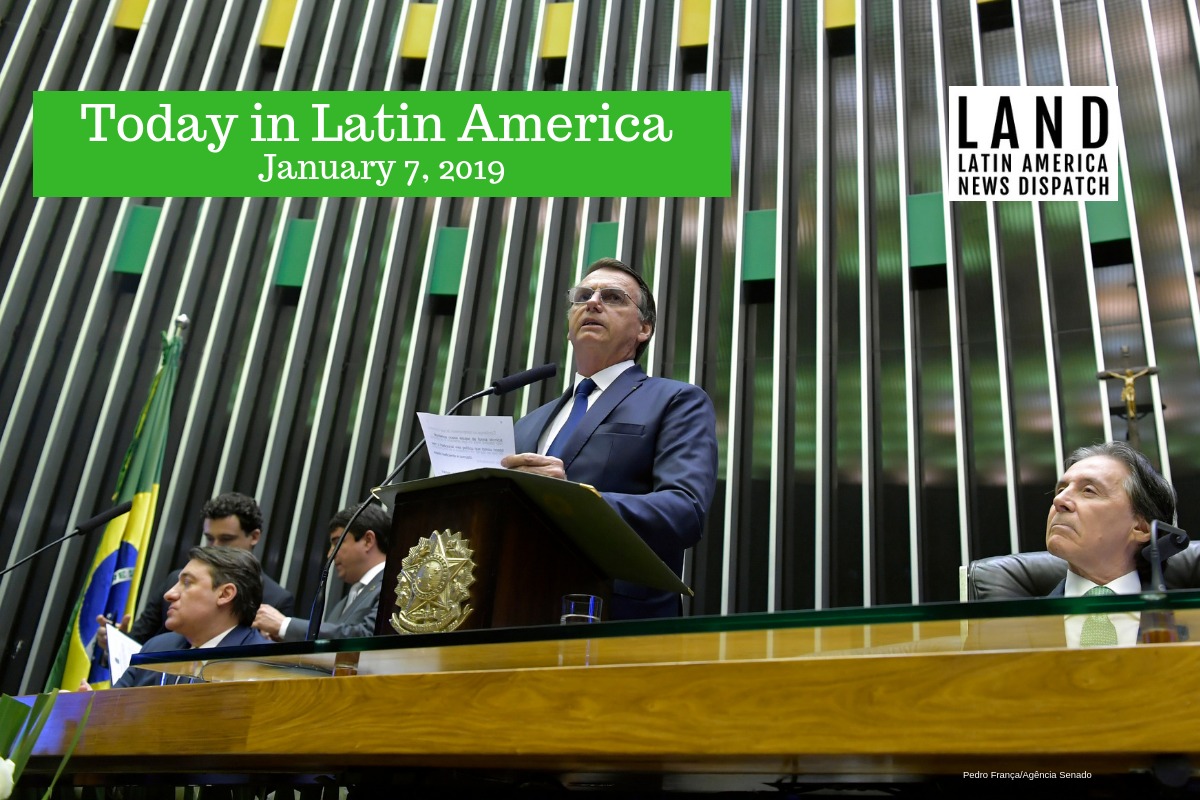

BRAZIL: Less than a week after taking office on New Year’s Day, President Jair Bolsonaro followed through with many of his campaign pledges, including conservative social reforms. So far, he has granted land allocation rights to the Ministry of Agriculture, proposed reforms to the pension system and excluded the LGBT community from protection by the Human Rights Ministry. These actions elicited praise from Bolsonaro’s supporters and investors but enraged members of the opposition.
Indigenous groups, environmentalists and activists demonized Bolsonaro’s decision to grant the Ministry of Agriculture the power to allocate indigenous territory, claiming it will both destroy the sovereign rights of the groups as well as endanger the Amazon region. His social reforms were also criticized after Damares Alves, the minister for women, family and human rights, promised to “end the indoctrination of children” and promised a Brazil where “boys wear blue and girls wear pink.”
In the United States, President Donald Trump praised Bolsonaro after his inauguration. Bolsonaro has been known for his admiration for Trump. On January 3, Bolsonaro expressed concern about Russia’s involvement in South America and its relation to Venezuela. He quickly proposed to open to a U.S. military base in the country to address the issue.
HEADLINES FROM THE WESTERN HEMISPHERE
NORTH AMERICA
UNITED STATES: President Trump told reporters Sunday that he was considering declaring a national emergency in order to secure military funding for the border wall. His announcement came as Vice President Mike Pence met with congressional leadership staff over the ongoing government shutdown and funding crisis, with no clear resolution in sight.
MEXICO: An activist from President Andrés Manuel López Obrador’s Morena party was shot by an unidentified assailant Sunday morning in Oaxaca. This came after two Morenistas were shot and killed on January 1, and another was shot and killed on January 3, all in Oaxaca. The activist shot Sunday was brought to a hospital and is being treated for multiple gun wounds.
MEXICO: Mexico has been plagued by a gas shortage after changes in distribution methods were instituted to avoid fuel theft by criminal gangs. The shortage has led to long lines throughout the country. In response, the state oil company Petróleos Mexicanos reopened the Salamanca-León pipeline to supply gas stations in the state of Guanajuato and announced that it was working to restore 100 percent of gas stations.
THE CARIBBEAN
CUBA: On January 5, the final draft of Cuba’s new constitution was published by the national gazette. If approved in a February 24 referendum, the constitution would enable the creation of a new office of the prime minister, who would serve as the head of government. The office would be created by the president, who would remain head of state. President Miguel Díaz-Canel is likely to be re-elected.
CENTRAL AMERICA
GUATEMALA: For 25 hours, airport authorities in Guatemala City prevented a CICIG investigator from entering the country until the Constitutional Court ordered his release. Guatemala’s attorney general issued arrests warrants for immigration agents who refused access to Yilen Osorio, a Colombian national. Osorio’s barring came despite an earlier ruling by the Constitutional Court, allowing CICIG’s personnel to enter the country after President Jimmy Morales removed diplomatic immunity to the commission’s officials in December. Civil society organizations issued a legal complaint, demanding for two ministers to resign for disobeying the court’s ruling.
EL SALVADOR: Although El Salvador remains among the deadliest countries in the world, the country’s murder rate dropped for the third straight year. The country recorded 50.3 homicides per 100,000 inhabitants, which represents a 15 percent decrease from 60.8 in 2016 and almost half of the 103 in 2015. The director of the Salvadoran National Police, Walter Cotto, highlighted the cases of 383 femicides and the 32 security agents killed during the last year as results of deadly gang violence.
THE ANDES
VENEZUELA: On January 4, a dozen Latin American governments and Canada signed an announcement rejecting the legitimacy of Venezuelan President Nicolás Maduro’s second term in office. Many members of the Lima Group, such as Mexico, abstained from signing the document, claiming it is a form of interventionism. The group urged Maduro to renounce his re-election and to cede power to the Congress until new elections can be held. Meanwhile in Venezuela, the opposition-led National Assembly decried the country’s humanitarian crisis and promised to fight Maduro’s regime. Maduro will be sworn in for his second six-year term on Thursday.
SOUTHERN CONE
ARGENTINA: The Vatican announced on January 4 that it is investigating a former Argentine bishop and current Holy See advisor after he was accused of alleged sexual abuse, abuse of power and economic abuse. Gustavo Zanchetta resigned from his bishop post in Orán in 2017 after he informed Pope Francis of his difficult relations with priests. He later claimed his resignation was due to health issues. Zanchetta was then appointed as an advisor for the APSA office of the Vatican, which administers the Vatican’s financial holdings. The three accusations against him from Argentine priests emerged last week.
NEW IN LAND
Steven Cohen reported why in the Putumayo region of Colombia the coca crop substitution plan —one of the resolutions stemming out of the FARC peace agreement of 2016— is bringing more chaos and death to the region, instead of the originally intended peace. You can read about that here.
GOT NEWS? Send the editors tips, articles and other items for inclusion in Today in Latin America to tips@latindispatch.com.


